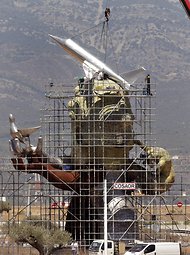Political interference, mismanagement and allegations of corruption have seen Valencia’s publicly funded TV station driven to the brink of collapse
FEDERICO SIMÓN Valencia 27 JUL 2012 – 13:16 CET1

A protest by Canal 9 employees against layoffs at the broadcaster in Valencia last week. / KAI FÖRSTERLING (EFE)
Spain’s regional governments have a lot to answer for given their role in the country’s financial crisis. Not only were regional authorities largely responsible for political interference in the local savings banks – the cajas- thus contributing to their demise, but they also ran up their own unsustainable debts, using publicly funded regional broadcasters as mere extensions of their parties’ communications departments.
In an interview in 1996, shortly after the Popular Party won its first general election, installing José María Aznar as prime minister, Eduardo Zaplana, the then-head of the regional government of Valencia, described television in Spain as “the last bastion of the Socialists.” The remedy, he continued, “is privatization, which we intend to carry out as soon as the necessary legislation has been passed.” His project was to begin with Valencia’s publicly funded regional station, Canal 9. Sixteen years later, after running up huge debts, his successor Alberto Fabra has effectively privatized the channel, laying off 76 percent of its staff, and outsourcing all program commissions.
Zaplana’s dream has finally been made possible after 16 years of mismanagement, which saw the station double its staffing levels, accumulate debts of 1.3 billion euros, and send its audience share down to 4.2 percent.
José Manuel Alcañiz was among the first 32 journalists who joined Canal 9 when it was launched in 1989. Initially appointed head of news, he says that after the Popular Party took over the regional administration of Valencia in 1995, he found himself increasingly isolated. “I was given fashion shows to cover; all the journalists were removed from any position of authority,” says Alcañiz.
Former Valencia premier called TV in Spain “last bastion of the Socialists”
Unable to sack journalists it considered politically unreliable, the new bosses at Canal 9 simply hired others to take their places: from 650 in 1995 to 1,800 in 2010. As a result, the station’s debt levels rose sharply: from 30 million euros in 1995 to 1.3 billion at the end of 2011.
With unsustainable salary costs, ever-mounting debts, and viewing figures continuing to fall, it was only a matter of time before Canal 9 would have to start laying people off. José López Jaraba – the current director general of Canal 9 owner RTVV, who was directly appointed by former regional premier Francisco Camps, forced to stand down last year over corruption allegations – told EL PAÍS that he has still not worked out who from the 1,295 members of staff to be sacked will be going, nor on what basis the remaining 400 staff members will continue to work, and quite how the outsourcing of programming will function.
When it was set up in 1989, RTVV’s brief was to provide radio and television programming in the Valencian language. Juli Esteve, who was coordinator of news services from the launch until the PP took over in 1995, says that there was no political interference under the Socialist Party government, even when news programs reported on the growing number of scandals that would eventually see the Socialists lose the general elections in 1996.
Esteve says that under the Socialist Party, RTVV was not authorized to run up debt. “Budgets were handled very carefully; after all, it was the taxpayer’s money.”
An employee who doesn’t want to give his name says that political interference began during the 1995 regional election campaign. Eduardo Zaplana, who was running for the premier’s position, demanded that only campaign events involving him could be broadcast, and he would get angry when coverage was given, for example, to Rita Barberá, who was his party’s candidate for mayor of Valencia. The source goes further, saying that Zaplana would make sure that camera operators would only shoot him from his “good side”.
All the journalists were removed from any position of authority”
Alcañiz says that when Zaplana won the elections, “Canal 9 became an extension of his communications department.” This was when the station’s costs began to mount. The in-house accounting committee questioned the fees being paid for television rights to broadcast sporting events, which were never matched by advertising revenue. RTVV even financed soccer clubs in the Valencia region, paying them twice the going rate for broadcasting rights.
When Francisco Camps took over as regional premier in 2003, he left RTVV alone. Although he was locked in a turf war with his predecessor, he managed to appoint his own people into key positions, with some senior executives moving out from RTVV to work for the regional government. Under Camps, RTVV’s news policy was simple: to sing the praises of the regional government and all it was doing for Valencia, while at the same time attacking the policies of the Socialist Party government of Prime Minister José Luis Rodríguez Zapatero. The opposition was excluded from news programs, and there was a blanket ban on reporting the mounting number of corruption cases involving the PP in Valencia. Anybody who watched just Canal 9 would be unaware of any link between Camps and the Gürtel kickbacks for contracts scandal. (It should not be noted that Camps was found not guilty of corruption charges by a jury in Valencia.)
RTVV’s labor unions accuse successive PP administrations of deliberately running the broadcaster into the ground over the years with the goal of eventually selling it off. Vicente Mifsud, the head of the in-house workers’ consultative board, says that the 54 million euros that RTVV aims to save by laying off 76 percent of the workforce will be spent “on production companies who will hire workers under precarious conditions, and any profits will go to private companies with links to the PP.”

